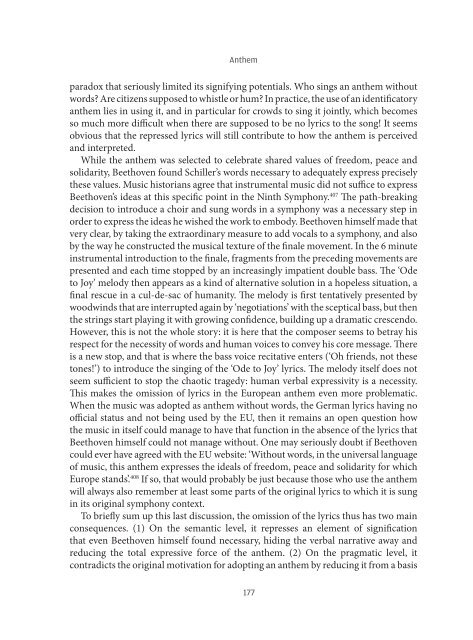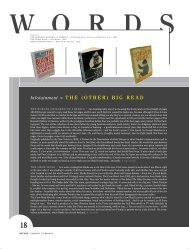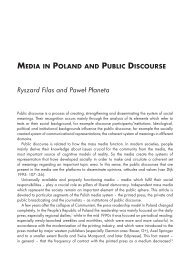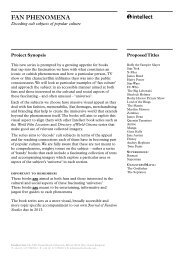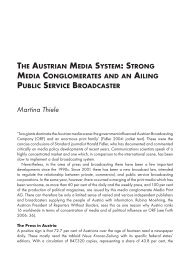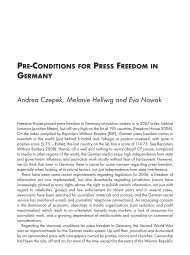Anthem - Intellect
Anthem - Intellect
Anthem - Intellect
You also want an ePaper? Increase the reach of your titles
YUMPU automatically turns print PDFs into web optimized ePapers that Google loves.
<strong>Anthem</strong><br />
paradox that seriously limited its signifying potentials. Who sings an anthem without<br />
words? Are citizens supposed to whistle or hum? In practice, the use of an identificatory<br />
anthem lies in using it, and in particular for crowds to sing it jointly, which becomes<br />
so much more difficult when there are supposed to be no lyrics to the song! It seems<br />
obvious that the repressed lyrics will still contribute to how the anthem is perceived<br />
and interpreted.<br />
While the anthem was selected to celebrate shared values of freedom, peace and<br />
solidarity, Beethoven found Schiller’s words necessary to adequately express precisely<br />
these values. Music historians agree that instrumental music did not suffice to express<br />
Beethoven’s ideas at this specific point in the Ninth Symphony. 407 The path-breaking<br />
decision to introduce a choir and sung words in a symphony was a necessary step in<br />
order to express the ideas he wished the work to embody. Beethoven himself made that<br />
very clear, by taking the extraordinary measure to add vocals to a symphony, and also<br />
by the way he constructed the musical texture of the finale movement. In the 6 minute<br />
instrumental introduction to the finale, fragments from the preceding movements are<br />
presented and each time stopped by an increasingly impatient double bass. The ‘Ode<br />
to Joy’ melody then appears as a kind of alternative solution in a hopeless situation, a<br />
final rescue in a cul-de-sac of humanity. The melody is first tentatively presented by<br />
woodwinds that are interrupted again by ‘negotiations’ with the sceptical bass, but then<br />
the strings start playing it with growing confidence, building up a dramatic crescendo.<br />
However, this is not the whole story: it is here that the composer seems to betray his<br />
respect for the necessity of words and human voices to convey his core message. There<br />
is a new stop, and that is where the bass voice recitative enters (‘Oh friends, not these<br />
tones!’) to introduce the singing of the ‘Ode to Joy’ lyrics. The melody itself does not<br />
seem sufficient to stop the chaotic tragedy: human verbal expressivity is a necessity.<br />
This makes the omission of lyrics in the European anthem even more problematic.<br />
When the music was adopted as anthem without words, the German lyrics having no<br />
official status and not being used by the EU, then it remains an open question how<br />
the music in itself could manage to have that function in the absence of the lyrics that<br />
Beethoven himself could not manage without. One may seriously doubt if Beethoven<br />
could ever have agreed with the EU website: ‘Without words, in the universal language<br />
of music, this anthem expresses the ideals of freedom, peace and solidarity for which<br />
Europe stands’. 408 If so, that would probably be just because those who use the anthem<br />
will always also remember at least some parts of the original lyrics to which it is sung<br />
in its original symphony context.<br />
To briefly sum up this last discussion, the omission of the lyrics thus has two main<br />
consequences. (1) On the semantic level, it represses an element of signification<br />
that even Beethoven himself found necessary, hiding the verbal narrative away and<br />
reducing the total expressive force of the anthem. (2) On the pragmatic level, it<br />
contradicts the original motivation for adopting an anthem by reducing it from a basis<br />
177


